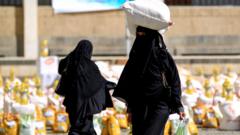The US government's decision to pause aid has left millions in Sudan vulnerable, worsening the already dire humanitarian crisis stemming from ongoing civil conflict.
**US Aid Reduction Sparks Humanitarian Crisis in Sudan**

**US Aid Reduction Sparks Humanitarian Crisis in Sudan**
With the cut in US humanitarian assistance, Sudan faces a looming famine as emergency food kitchens shut down.
The freezing of US humanitarian aid has resulted in the closure of nearly 80% of emergency food kitchens essential for the survival of those affected by Sudan's civil war. Recent reports indicate that over 1,100 communal kitchens, which provided vital support to destitute citizens, have ceased operations due to a 90-day halt of contributions by USAID, instituted by President Donald Trump.
With the conflict between the Sudanese army and paramilitary forces claiming tens of thousands of lives and displacing millions since April 2023, nearly two million individuals are now struggling to survive without access to food. Grassroots organizers describe desperate scenes as people "scream from hunger in the streets." The operational shutdown of these kitchens represents a significant hurdle for humanitarian efforts aimed at combating the world's most severe hunger crisis, particularly highlighted in five regions where famine conditions have emerged.
Despite an exemption issued by the State Department for emergency food assistance, local groups remain uncertain about the implications of this waiver, as existing mechanisms to access funding have been dismantled. Historically, USAID supplied 70-80% of the funding necessary for operational kitchens, and the legal ambiguity surrounding current food assistance poses great challenges.
Former USAID officials are actively seeking private donations to temporarily fill the funding void left by the aid reduction. Concerns grow that ongoing conflicts and rising food shortages will lead to an increase in starvation among the vulnerable populations. Additionally, the UN has indicated that the repercussions of this aid suspension will reverberate beyond Sudan’s borders, with millions of refugees seeking safety in neighboring countries, further insolating dwindling resources.
Key indicators of humanitarian strain are apparent as UN leaders report that the mass influx of refugees has overburdened already scarce resources. Families are now surviving on one meal a day, as the ongoing conflict dismantles agricultural production and basic access to food. This scenario is further exacerbated by a growing number of refugees who are reportedly trying to engage in perilous labor, including the sale of firewood, merely to capture the attention of support services that remain overwhelmed.
The likelihood of renewed conflict this year has prompted many displaced individuals to explore perilous journeys to other countries, as desperate circumstances continue to escalate without clear pathways for relief. Though private donations may serve as a temporary bandage on a worsening scenario, the future remains uncertain as organizations grapple with limited capacities and ongoing humanitarian needs.
As the debate over US foreign aid continues to evolve, the survival of millions in Sudan hangs precariously in the balance amid political and logistical turmoil.
With the conflict between the Sudanese army and paramilitary forces claiming tens of thousands of lives and displacing millions since April 2023, nearly two million individuals are now struggling to survive without access to food. Grassroots organizers describe desperate scenes as people "scream from hunger in the streets." The operational shutdown of these kitchens represents a significant hurdle for humanitarian efforts aimed at combating the world's most severe hunger crisis, particularly highlighted in five regions where famine conditions have emerged.
Despite an exemption issued by the State Department for emergency food assistance, local groups remain uncertain about the implications of this waiver, as existing mechanisms to access funding have been dismantled. Historically, USAID supplied 70-80% of the funding necessary for operational kitchens, and the legal ambiguity surrounding current food assistance poses great challenges.
Former USAID officials are actively seeking private donations to temporarily fill the funding void left by the aid reduction. Concerns grow that ongoing conflicts and rising food shortages will lead to an increase in starvation among the vulnerable populations. Additionally, the UN has indicated that the repercussions of this aid suspension will reverberate beyond Sudan’s borders, with millions of refugees seeking safety in neighboring countries, further insolating dwindling resources.
Key indicators of humanitarian strain are apparent as UN leaders report that the mass influx of refugees has overburdened already scarce resources. Families are now surviving on one meal a day, as the ongoing conflict dismantles agricultural production and basic access to food. This scenario is further exacerbated by a growing number of refugees who are reportedly trying to engage in perilous labor, including the sale of firewood, merely to capture the attention of support services that remain overwhelmed.
The likelihood of renewed conflict this year has prompted many displaced individuals to explore perilous journeys to other countries, as desperate circumstances continue to escalate without clear pathways for relief. Though private donations may serve as a temporary bandage on a worsening scenario, the future remains uncertain as organizations grapple with limited capacities and ongoing humanitarian needs.
As the debate over US foreign aid continues to evolve, the survival of millions in Sudan hangs precariously in the balance amid political and logistical turmoil.



















